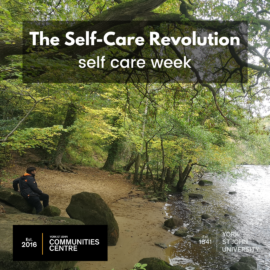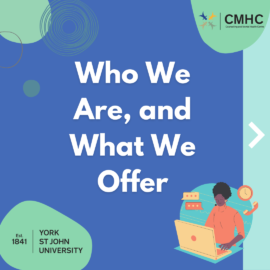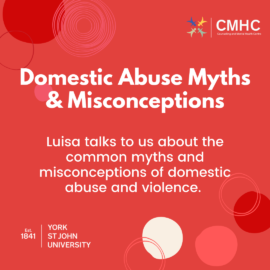For OCD awareness week I (Shannon) have been honoured to speak with Kailyn Rector, a mental health advocate who is working to break the stigma around OCD. Kailyn is a 20 year old psychology student who runs an Instagram page called ‘peacewithocd’, where she shares important information to educate others on the different aspects of living with OCD. Kailyn has kindly offered to answer some questions about her experiences of receiving a diagnosis of OCD, the stigma and myths around the disorder, and how she manages her process of recovery.
At what point in your life did you, or others, suspect that you have OCD?
There are several answers to this question – the point where I suspected, the point where my friends suspected, and the point where my family suspected.
The point in which I suspected that I might be living with Obsessive Compulsive Disorder was in March of 2021. Out of (seemingly) nowhere, my mental and physical condition deteriorated. I first became unable to eat- too afraid I might have suddenly developed an allergy that would send me into anaphylaxis. This progressed into being unable to shower out of fear of allergies to soap, before switching to Real Event and taboo themes. Intrusive thoughts seemed to control my every waking moment. It was then that I became educated on what OCD really is, and began to look back on periods of my life where I had “suddenly” become very mentally ill, seemingly all at once. It was almost overwhelming to admit to myself all of the signs that were always there, even before my first ever OCD “episode.”
Unlike my experience, my loved ones realized how badly I had always had OCD only after I was diagnosed. I think this is a very important issue that a lot of children/teens with OCD may face; parents are unaware of what OCD actually is, and are therefore unaware of how to spot it. Looking back, my grandmother says that she can see how it has always impacted me; strict routines that gave me terrible anxiety even as a small child, magical thinking that my actions would keep others safe, intrusive, constant and debilitating intrusive thoughts that practically ceased my ability to function at the young age of 14. If the resources were there all along, maybe this would not have been the case for me.
What was the process like of receiving a diagnosis of OCD?
It was difficult for me to receive a proper diagnosis. Growing up in a small town with limited mental health resources, I found that many mental health professionals actually had no idea what OCD was. I actually had a therapist tell me “Haha – well you know OCD people love to clean.”
What are some of the common experiences of stigma that people with OCD face?
I would definitely say that those with OCD are met with an incredible amount of stigmas. More often than not, society portrays Obsessive Compulsive Disorder as a “quirky love of cleaning.” This promotes the idea that sufferers of OCD are clean, tidy and neat. In actuality, oftentimes OCD obsessions have nothing to do with cleaning or germs.
What are some of the things that have helped you come to terms with your diagnosis?
The amazing online OCD community has played an incredible part in the acceptance of my diagnosis. This, along with the many incredible people I’ve met since receiving my diagnosis. Although the mental health community still has a long way to go in the understanding of OCD, the incredible amount of education from therapists online (such as Chrissie Hodges) really facilitated my acceptance of my diagnosis.
What motivates you in your recovery/journey with OCD?
The main thing that motivates me in my recovery journey is the possibility of helping others who are struggling. When I was at my worst, I had no idea that obsessions could be of a taboo nature. I had no idea of the thousands of symptoms, and I was therefore left incredibly terrified and isolated. Now that I’ve begun to recover, my main motivator is the thought of being able to educate others. This has ended up being incredibly rewarding, actually making me feel so much less alone. This journey has also allowed me to meet one of my best friends, so it’s always important to remember that beauty comes out of this too.
What are some of the biggest myths about OCD and how do you respond to them?
I’d definitely say the biggest myths surrounding OCD are that it is a “love of cleaning”, a “desire for organization”, and an adjective to describe rigid people. I always respond to these fallacies by educating on the darkest parts of the disorder – taboo obsessions, harm obsessions, the terrifying nature of compulsions, etc.
Is there anything you would like to say to mental health professionals who work with individuals who have OCD?
As someone who has met with and spoken to thousands of people living with OCD, I would say to always make sure you are as educated on the disorder as possible. Sufferers commonly experience taboo, sexual, or harm obsessions, and do not deserve anything less than support and understanding from those they seek medical help from. Many of the people who reach out to me are young children/teens who are not comfortable sharing the content of their obsessions with their parents, and these are the exact people who need you the most.
Is there anything you would like to say to someone who might be reading this and questioning whether they have OCD or are struggling to manage their OCD?
If you are reading this and believe you may be struggling with OCD, the first thing I want you to know is that you are not alone. No matter the content of your obsessions, no matter how much shame you may be feeling, so many professionals understand. If you’re worrying about who you can reach out to, check to see if there are any OCD specialists near you. There are also some amazing online professionals who specialize in the treatment and education of OCD.
If you are struggling to manage your OCD, I would say the best thing you can do is speak with your medical professional. There are many options – medication, therapy, books, workbooks. I would also say to surround yourself in the Instagram OCD community, as there are hundreds of thousands of people who truly understand.
https://www.instagram.com/peacewithocd/
Useful links for OCD support:
OCD Action – Information and support for people affected by OCD and hoarding, including online forums and local support groups.
0300 636 5478
OCD UK – Charity run by and for people with OCD.
03332 127890
TOP UK – OCD and phobia charity, currently offering online support groups.
01225 571740



